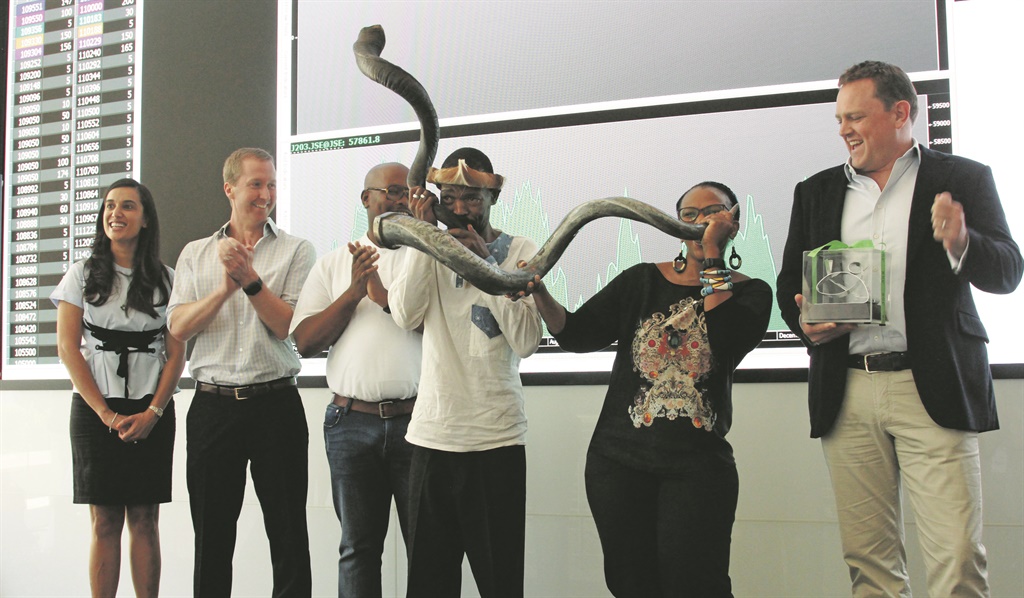
More than 40 000 South Africans who became shareholders in SA Breweries’ (SAB) Zenzele broad-based BEE scheme 10 years ago will have jointly received approximately R14 billion when the scheme winds down in April.
So far, the scheme has paid out R4 billion in dividends, and another R9.7 billion is on its way to beneficiaries when the scheme matures.
SAB Zenzele is a truly transformative scheme that added tangible value to investors – SAB Zenzele retailer shareholders who invested R100 in 2010 will receive a pre-tax payout of R76 000 when the scheme unwinds, according to a SENS announcement by SAB’s mother company AB InBev on Monday.
As if that is not reason enough for celebration, SAB also announced this week that a new broad-based BEE scheme, aptly named SAB Zenzele Kabili, will become active and be made available to 35 000 beneficiaries in April. The new ownership transaction will own R5.4 billion worth of AB InBev shares.
With the new scheme, the proud brewer has taken another bold step, entrenching its commitment to its long-term prospects in South Africa. SAB Zenzele Kabili will be listed on the BEE segment of the JSE, which will broaden ownership and financial inclusion to other broad-based BEE investors, including SAB employees, through a new employee share ownership plan, said Richard Rivett-Carnac, director of mergers and acquisitions and treasury at SAB and AB InBev Africa.
The announcement was made at an event at the JSE on Monday, with some of the beneficiaries of the SAB Zenzele scheme in attendance. There was much excitement in the air, and when the energetic and internationally acclaimed Ndlovu Youth Choir took to the stage, the attendees were delighted.
SAB Zenzele was created in 2010 to generate sustainable ownership, and build lasting legacies and economic wealth opportunities for previously disadvantaged groups, the company said. It has delivered spectacularly on this objective.
When the scheme was set up, SAB Zenzele transferred 8.45% ownership of SAB shares to more than 40 000 shareholders. Beneficiaries of the scheme are the SAB Zenzele Employee Trust, which holds 40% of shares for the benefit of SAB employees; SAB Zenzele Holdings Limited, which has 42% of shares for the benefit of qualifying beer and cooldrink retailers; and the SAB Foundation Trust, which owns 18% and supports entrepreneurship projects that benefit low-income communities.
Zoleka Lisa, vice-president of corporate affairs and a beneficiary herself at the SAB unit of AB InBev, said this was the biggest broad-based BEE payout in the fast-moving consumer goods sector in South African history, and one of the country’s most successful empowerment schemes.
When the SAB Zenzele scheme matures at the end of next month, shareholders will have multiple options available to them, one of which is that they will have the opportunity to reinvest a portion of their allocation into the new SAB Zenzele Kabili scheme. Alternatives include receiving proceeds in the form of AB InBev shares or to receive the proceeds in cash.
Rivett-Carnac said: “From the outset, SAB Zenzele sought to be genuinely broad-based and to deliver real economic benefits to the lives of thousands of South Africans. I am very proud of the degree to which SAB Zenzele delivered against this initial objective.”
The new scheme will be built on the strengths of SAB Zenzele, but will be different in a number of ways. The changes are being put in place following constant engagement with stakeholders, including the National Empowerment Fund and the Food and Allied Workers’ Union over the past 10 years, added Rivett-Carnac.
“This time around, we have decided to allocate an equal amount of shares to each employee, regardless of his or her position within the company. In practical terms, this means every employee will get about R400 000 in gross value when the scheme is launched. For most SAB employees, this represents a significant increase in real terms on the 2010 allocation,” said Rivett-Carnac.
Other improvements to the scheme include addressing limited access to liquidity and issues regarding the transparency of pricing. For example, beneficiaries weren’t always sure about what their shares were really worth.
Both of these issues will be successfully addressed through the public listing of SAB Zenzele Kabili on April 15, he said.
SAB Zenzele Kabili will have approximately 35 000 beneficiaries. Between 5 000 and 6 000 employees will be part of the new employee share ownership plan, and there will be additional investment from the SAB Foundation Trust.
New employees will be expected to retain their shares for five years before they will be allowed to trade any of their shares. However, retailers and employees who are part of the current employee share ownership plan will have the freedom to trade from day one.
Rivett-Carnac said that, although the price would be determined by market conditions, the target price was about R40 per share.
This week, Andrew Murray, vice-president of finance at SAB, said he first became aware of SAB Zenzele in 2014 while he was working for AB InBev’s global mergers and acquisitions division in New York in the US, where he did a due diligence study on SABMiller, which AB InBev has since acquired. He said it showed the company’s commitment to South Africa, as well to as its people and future.
“SAB is committed to contributing to long-term economic growth and development in South Africa. AB InBev has a deep respect for the tradition and heritage of SAB. We are here today celebrating that commitment to South Africa, celebrating commitment to ownership and celebrating a commitment for the next 125 years to be as important in the lives of South Africans as we have been over the past 125 years.”
STORIES OF EMPOWERMENT
When what was then SABMiller first announced its proposed broad-based BEE transaction back in 2009, it said the ownership transaction reflected the company’s long-standing and continuing commitment to socioeconomic progress in South African society.
Richard Rivett-Carnac, director of mergers and acquisitions and treasury at SAB and AB InBev Africa, said that, from the outset, it was important to deliver real economic benefits to the lives of thousands of South Africans.
One such South African is Jane Makhanya, owner of Getty’s Tavern in Tembisa. She inherited the business from her mother, but, like many entrepreneurs, she faced many struggles before she triumphed.
When the SAB Zenzele scheme was launched in 2010, reps from the company explained how it would work, and Makhanya invested R5 000.
She says she used her dividends over the years to reinvest in her business, upgrade her house and support her family.
Maniki Lawrence Dunge (72), the owner of Dunge Liquor Store and Dunge Bar in rural KwaZulu-Natal, plays an important role in his community. His businesses directly impacts and benefits the 20 people he employs permanently.
Asaph Mola, who worked in SAB’s engineering department for 32 years, retired last year.
He remembers his early days at SAB, when the head office was still in Braamfontein in Johannesburg’s CBD.
“In those days, you could still sit across the street at a small restaurant and have a beer for lunch,” he chuckles.
He says he was born on August 15 1962, which was when black people were, for the first time, allowed to buy liquor from certain outlets.
He says his father bought lots of beer that day and invited many people to come over and celebrate the arrival of his newborn son.
Mola, as an SAB employee, has shares in SAB Zenzele. He says it changed his life – the most important purchase he made with the money was a 65-inch television for his wife, who begged for one for years, he jokes.
But it also taught him to be serious about investment. Over the years, he has invested most of the dividends he received and also plans to invest the money that will be paid out when the scheme winds down in April.
Bright Khumalo, portfolio manager at Vestact Asset Management, says SAB Zenzele is a good example of a broad-based BEE scheme that has created a lot of wealth for its shareholders.
“This is definitely a great step towards financial inclusion. The big companies can always do more because they have the capacity and resources to do so.”
These schemes – which include Sasol Inzalo, MTN Zakhele and MultiChoice’s Phuthuma Nathi – are impacted by the economy in the same way it impacts the company listed on the JSE because these schemes are born from JSE-listed companies and don’t exist in a vacuum, says Khumalo.
On what drives the success of these schemes, Khumalo says: “The success of a broad-based BEE scheme and the success of its mother company are intertwined. Some schemes have better financial engineering – for example, offering vendor financing in the structuring of the deal. Vendor financing enables the scheme to leverage its position on the mother company’s share price, but the ultimate success resides with the mother company.
“If the share price of the mother company does well, you expect the scheme to be a success. On the other hand, if the mother company’s share price tanks, the scheme could lose its value.”
- The scheme, which remains subject to shareholder approval, will replace and build on the success of SAB Zenzele with the intention of generating value for existing and new BEE investors.
- The R5.4 billion SAB Zenzele Kabili transaction will be funded through a combination of a R678 million equity contribution from existing SAB Zenzele shareholders, a R600 million equity contribution from a new broad-based employee share ownership plan funded by SAB, a R344 million reinvestment by the SAB Foundation Trust, R811 million of AB InBev discounted shares from SAB and R2.9 billionof 10-year preference share vendor funding from SAB.
- SAB Zenzele Kabili shareholders will be able to trade their SAB Zenzele Kabili shares from the outset and will be entitled to receive dividends.




 Publications
Publications
 Partners
Partners









